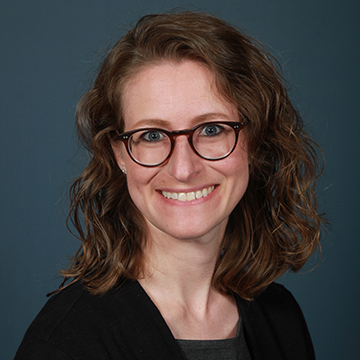From Bench to Boardroom, Stolzenburg Aids Investigators
From the research bench to the boardroom, Lindsay Stolzenburg, PhD, helps investigators navigate the intersection of life science and entrepreneurship.
As a senior invention associate at Northwestern University’s Innovation and New Ventures Office (INVO), Stolzenburg maintains a passion for transforming inventive biotechnologies into real-world therapies. It’s at INVO that she explores opportunities to patent and commercialize Northwestern technologies while championing investigator interests. Balancing her role at Northwestern with family life and community involvement, Stolzenburg exemplifies how creative collaboration can lead to health advancements.
Stolzenburg graduated from the University of Rochester in 2012 with a BS in Molecular Genetics. She then went on to pursue a PhD in the field as part of Northwestern University’s Driskill Graduate Program. In 2017, she completed her thesis work studying genetic modifiers of cystic fibrosis lung disease severity.

By liaising with relevant stakeholders, I drive execution on intellectual property strategy, marketing of the technology, and licensing it to commercial partners.”
Lindsay Stolzenburg, PhD, INVO Senior Invention Associate
Before joining INVO in 2023, Stolzenburg completed postdoctoral fellowships at the University of Chicago and AbbVie, investigating genetic modifiers of MYC-driven cancers and Alzheimer's disease. She also aided in the development of therapies for neurodevelopmental diseases as a scientist at a Chicago-based biotech company.
In her role as a senior invention associate, Stolzenburg works with Northwestern researchers to patent and commercialize novel technologies, managing a portfolio of intellectual property in the life science space, including therapeutics and research tools. As a Research Navigator connecting INVO with the Northwestern University Clinical and Translational Sciences (NUCATS) Institute, she helps investigators advance the development of biomedical initiatives by connecting them to resources and opportunities. Her work helps promote Northwestern technologies to potential investors and commercial partners with a broader goal of translating these innovations into the world to improve human health.
I’ve been able to supplement my scientific training with real world know-how, which has made me a more well-rounded scientist and person. It’s an impactful career trajectory for scientists who want to push academic discoveries beyond the boundaries of academia.”

“Day-to-day, this work mostly involves meeting with faculty to understand their technologies, the underlying science, and commercialization potential,” she says. “Then, by liaising with relevant stakeholders, I drive execution on intellectual property strategy, marketing of the technology, and licensing it to commercial partners. In addition, I help bring in expert feedback for projects when needed and connect faculty to key resources to help advance the technology towards commercialization.”
Stolzenburg appreciates the ability to support innovation across various areas of biomedicine and interact with many types of experts — faculty, lawyers, CEOs, venture capitalists, and more — who have diverse skills and business interests.
“The opportunity to help move a technology that is still in its infancy to a point at which it can become a real product is really exciting. It’s wonderful to be able to work with a lot of different people who have diverse areas of expertise — and to help piece together when and how to utilize everyone’s different skillsets,” Stolzenburg says.
When asked what she wished more people knew about her role, Stolzenburg offers a straightforward response: “That it exists!” She hopes to improve visibility of her role and INVO in the coming year.
“Technology transfer offices are positioned between the academic and industrial sectors, and so we get to see both worlds. I’ve been able to supplement my scientific training with real world know-how, which has made me a more well-rounded scientist and person. It’s an impactful career trajectory for scientists who want to push academic discoveries beyond the boundaries of academia.”
In her free time, Stolzenburg and her husband — a Northwestern alum she met in grad school — enjoy living with their two-year-old son and two “rambunctious” cats, Puffin and Chowder. She volunteers for the Parkinson’s Foundation to support their annual Moving Day and is part of the leadership team for the Chicago Chapter of Women in Bio.
Written by Alex Miranda




